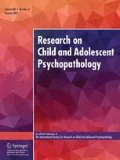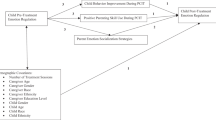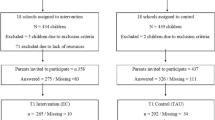Abstract
This paper evaluates the real-world effectiveness of an emotion-focused, multi-systemic early intervention combining an emotion socialization parenting program with a child and school socio-emotional intervention for children with emerging conduct problems. Schools in lower socioeconomic areas of Victoria, Australia were randomized into intervention or wait-list control. Children in the first 4 years of elementary school were screened for behavior problems and those in the top 8 % of severity were invited to participate in the intervention. The study sample consisted of 204 primary caregivers and their children (Mage = 7.05, SD = 1.06; 74 % boys). Data were collected at baseline and 10 months later using parent and teacher reports and direct child assessment. Measures of parent emotion socialization, family emotion expressiveness, and children’s emotion competence, social competence and behavior were administered. Results showed intervention parents but not controls became less emotionally dismissive and increased in empathy, and children showed better emotion understanding and behavior compared to control children. These outcomes lend support for an emotion-focused approach to early intervention in a real-world context for children with conduct problems.

Similar content being viewed by others
References
Assemany, A. E., & McIntosh, D. E. (2002). Negative treatment outcomes of behavioural parent training programs. Psychology in the Schools, 39, 209–219.
Australian Bureau of Statistics. (2011). 2009–10 household income and income distribution. Canberra: Commonwealth of Australia.
Bono, C., Ried, L. D., Kimberlin, C., & Vogel, B. (2007). Missing data on the center for epidemiologic studies depression scale: a comparison of 4 imputation techniques. Research in Social and Administrative Pharmacy, 3, 1–27. doi:10.1016/j.sapharm.2006.04.001.
Cohen, J. (1988). Statistical power analysis for the behavioral sciences (2nd ed.). Hillsdale: Lawrence Erlbaum Associates.
Conduct Problems Prevention Research Group. (1990). Social Competence Scale (Teacher Version) Retrieved November 3, 2007, from http://www.fasttrackproject.org.
Conduct Problems Prevention Research Group. (2002). Evaluation of the first 3 years of the Fast Track prevention trial with children at high risk for adolescent conduct problems. Journal of Abnormal Child Psychology, 30, 19–35.
Denham, S. A. (1998). Emotional development in young children. New York: The Guilford Press.
Domitrovich, C. E., & Greenberg, M. T. (2004). Introduction to the special issue: preventive interventions with young children: building on the foundation of early intervneiton programs. Early Education and Development, 15, 365–370. doi:10.1207/s15566935eed1504 1.
Dumas, J. E. (2005). Mindfulness-based parent training: strategies to lessen the grip of automaticity in families with disruptive children. Journal of Clinical Child & Adolescent Psychology, 34, 779–791.
Duncombe, M. E., Havighurst, S. S., Holland, K. A., & Frankling, E. J. (2012a). The contribution of parenting practices and parent emotion factors in children at risk for disruptive behaviour disorders. Child Psychiatry and Human Development, 43, 715–733. doi:10.1007/s10578-012-0290-5.
Duncombe, M. E., Havighurst, S. S., Holland, K. A., & Frankling, E. J. (2012b). Psychometric evaluation of a brief parent- and teacher-rated screen for children at risk of conduct disorder. Australian Journal of Educational & Developmental Psychology, 12, 1–11.
Duncombe, M. E., Havighurst, S. S., Kehoe, C. E., Holland, K. A., Frankling, E. J., & Stargatt, R. (2014). Comparing an Emotion- and a Behavior-Focused Parenting Program as part of a Multi-systemic Intervention for Child Conduct Problems. Journal of Clinical Child and Adolescent Psychology. in press.
Durlak, J. A., Weissberg, R. P., Dymnicki, A. B., Taylor, R. D., & Schellinger, K. B. (2011). The impact of enhancing students’ social and emotional learning: a meta-analysis of school-based universal interventions. Child Development, 82, 405–432. doi:10.1111/j.1467-8624.2010.01564.x.
Eisenberg, N., Cumberland, A., & Spinrad, T. L. (1998). Parental socialization of emotion. Psychological Inquiry, 9, 241–273. doi:10.1207/s15327965pli0904_1.
Eisenberg, N., Cumberland, A., Spinrad, T. L., Fabes, R. A., Shepard, S. A., Reiser, M., Murphy, B. C., Losoya, S. H., & Guthrie, I. K. (2001). The relations of regulation and emotionality to children’s externalizing and internalizing problem behavior. Child Development, 72, 1112–1134.
Eisenberg, N., Fabes, R. A., Shepard, S. A., Guthrie, I. K., Murphy, B. C., & Reiser, M. (1999). Parental reactions to children’s negative emotions: longitudinal relations to quality of children’s social functioning. Child Development, 70, 513–534.
Eisenberg, N., Sadovsky, A., Spinrad, T. L., Fabes, R. A., Losoya, S., Valiente, C., Reiser, M., Cumberland, A., & Shepard, S. A. (2005). The relations of problem behaviour status to children’s negative emotionality, effortful control, and impulsivity: concurrent relations and prediction of change. Developmental Psychology, 41, 193–211.
Eyberg, S., & Pincus, D. (1999). Eyberg Child Behavior Inventory and Sutter-Eyberg Student Behavior Inventory- Revised: Professional Manual. Odessa: Psychological Assessment Resources, Inc.
Feingold, A. (2009). Effect sizes for growth-modeling analysis for controlled clinical trials in the same metric as for classical analysis. Psychological Methods, 14, 43–53. doi:10.1037/a0014699.
Fernandez, M. A., & Eyberg, S. M. (2009). Predicting treatment and follow-up attrition in parent–child interaction therapy. Journal of Abnormal Child Psychology, 37, 431–441. doi:10.1007/s10802-008-9281-1.
Field, A. (2009). Discovering statistics using SPSS (3rd ed.). London: Sage.
Gifford-Smith, M. (2000). Teacher Social Competence Scale; Grade 4/Year 5 Update. Fast Track Project Technical Report.
Goodman, R. (1997). The strengths and difficulties questionnaire: a research note. Journal of Child Psychology and Psychiatry, 38, 581–586.
Gottman, J. M., & DeClaire, J. (1997). The heart of parenting: How to raise an emotionally intelligent child. London: Bloomsbury.
Gottman, J. M., Katz, L. F., & Hooven, C. (1997). Meta-emotion: How families communicate emotionally. Mahway: Lawrence Erlbaum Assoc.
Greenberg, M. T. (2007). Friendship Group materials. Personal communication.
Greenberg, M. T., Kusche, C. A., Cook, E. T., & Quamma, J. P. (1995). Promoting emotional competence in school-aged children: the effects of the PATHS curriculum. Development and Psychopathology, 7, 117–136.
Halberstadt, A. G., Cassidy, J., Stifter, C. A., Parke, R. D., & Fox, N. A. (1995). Self-expressiveness within the family context: psychometric support for a new measure. Psychological Assessment, 7, 93–103.
Havighurst, S. S., & Harley, A. (2007). Tuning in to kids: Emotionally intelligent parenting program manual. Melbourne: University of Melbourne.
Havighurst, S. S., Wilson, K. R., Harley, A. E., Kehoe, C., Efron, D., & Prior, M. R. (2013). “Tuning into Kids”: reducing young children’s behavior problems using an emotion coaching parenting program. Child Psychiatry & Human Development, 44, 247–264. doi:10.1007/s10578-012-0322-1.
Havighurst, S. S., Wilson, K. R., Harley, A. E., & Prior, M. R. (2009). Tuning in to kids: an emotion-focused parenting program - initial findings from a community trial. Journal of Community Psychology, 37, 1008–1023. doi:10.1002/jcop.20345.
Havighurst, S. S., Wilson, K. R., Harley, A. E., Prior, M. R., & Kehoe, C. (2010). Tuning in to Kids: improving emotion socialization practices in parents of preschool children – findings from a community trial. Journal of Child Psychology and Psychiatry, 51, 1342–1350. doi:10.1111/j.1469-7610.2010.02303.x.
Heck, R. H., Thomas, S. L., & Tabata, L. N. (2010). Multilevel and longitudinal modeling with IBM SPSS: Quantitative methodology series. New York: Rutledge.
Humphrey, N., Kalambouka, A., Wigelsworth, M., & Lendrum, A. (2010). Going for Goals: an evaluation of a short, social-emotional intervention for primary school children. School Psychology International, 31, 250–270. doi:10.1177/0143034309352578.
Jacobson, N. S., & Truax, P. (1991). Clinical significance: a statistical approach to defining meaningful change in psychotherapy research. Journal of Consulting and Clinical Psychology, 59, 12–19.
Kaufman, J., Birmaher, B., Brent, D., Rao, U., Flynn, C., Moreci, P., & Ryan, N. (1997). Schedule for Affective Disorders and Schizophrenia for School-Age Children - Present and Lifetime Version (K-SADS-PL): initial reliability and validity data. Journal of the American Academy of Child & Adolescent Psychiatry, 36, 980–988.
Kusche, C. A., Greenberg, M., & Beilke, B. (1988). The Kusche affective interview. University of Washington, Department of Psychology: Seattle, WA.
Lagacé-Séguin, D. G., & Coplan, R. (2005). Maternal emotional styles and child social adjustment: assessment, correlates, outcomes and goodness of fit in early childhood. Social Development, 14, 613–636. doi:10.1111/j.1467-9507.2005.00320.x.
Lauw, M. S. M., Havighurst, S. S., Wilson, K. R., Harley, A. E., & Northam, E. A. (2014). Improving parenting of toddlers’ emotions using an emotion coaching parenting program: a pilot study of tuning in to toddlers. Journal of Community Psychology, 42, 169–175. doi:10.1002/jcop.21602.
Leerkes, E. M., & Crockenberg, S. C. (2006). Antecedents of mothers’ emotional and cognitive responses to infant distress: the role of family, mother, and infant characteristics. Infant Mental Health Journal, 27, 405–428.
Littlefield, L., Story, K., Woolcock, C., Trinder, M., Burke, S., & Reid, K. (2005). Exploring Together: Preschool and school program manual. Melbourne: Exploring Together.
Moffitt, T. E. (1993). Adolescent-limited and life-course-persistent antisocial behavior: a developmental taxonomy. Psychological Review, 100, 674–701.
Morris, A. S., Silk, J. S., Steinberg, L., Terranova, A. M., & Kithakye, M. (2010). Concurrent and longitudinal links between children’s externalizing behavior in school and observed anger regulation in the mother-child dyad. Journal of Psychopathology and Behavioural Assessment, 32, 48–56.
Olson, S. L., Lopez-Duran, N., Lunkenheimer, E. S., Chang, H., & Sameroff, A. J. (2011). Individual differences in the development of early peer aggression: integrating contributions of self-regulation, theory of mind, and parenting. Development and Psychopathology, 23, 253–266. doi:10.1017/S0954579410000775.
Peugh, J. L., & Enders, C. K. (2005). Using the SPSS mixed procedure to fit cross-sectional and longitudinal multilevel models. Educational and Psychological Measurement, 65, 717–741.
Pocock, S. J., Assmann, S. E., Enos, L. E., & Kasten, L. E. (2002). Subgroup analysis, covariate adjustment and baseline comparisons in clinical trial reporting: current practice and problems. Statistics in Medicine, 21, 2917–2930.
Pons, F., Harris, P. L., & de Rosnay, M. (2004). Emotion comprehension between 3 and 11 years: developmental periods and hierarchical organization. European Journal of Developmental Psychology, 1, 127–152. doi:10.1080/17405620344000022.
Ramsden, S. R., & Hubbard, J. A. (2002). Family expressiveness and parental emotion coaching: their role in children’s emotion regulation and aggression. Journal of Abnormal Child Psychology, 30, 657–667.
Salmon, K., Dadds, M., Allen, J., & Hawes, D. (2009). Can emotional language skills be taught during parent training for conduct problem children? Child Psychiatry and Human Development, 40, 485–498.
Sanders, M. R., Gooley, S., & Nicholson, J. (2000). Early intervention in conduct problems in children. In R. Kosky, A. O’Hanlon, G. Martin, & C. Davis (Eds.), Clinical approaches to early intervention in child and adolescent mental health (Vol. 3). Adelaide: Australian Early Intervention Network for Mental Health in Young People.
Sawyer, M., Arney, F., Baghurst, P., Clark, J. J., Graetz, B. W., Kosky, R. J., & Zubrick, S. (2000). Mental health of young people in Australia: Child and adolescent component of the national survey of mental health and well-being. Canberra: Commonwealth Department of Health and Aged Care.
Schaffer, M., Clark, S., & Jeglic, E. L. (2009). The role of empathy and parenting style in the development of antisocial behaviors. Crime & Delinquency, 55, 586–599. doi:10.1177/0011128708321359.
Scott, S., & Dadds, M. R. (2009). Practitioner review: when parent training doesn’t work: theory-driven clinical strategies. Journal of Child Psychology and Psychiatry, and Allied Disciplines, 50, 1441–1450.
Southam-Gerow, M. A., & Kendall, P. C. (2002). Emotion regulation and understanding: implications for child psychopathology and therapy. Clinical Psychology Review, 22, 189–222.
Thomas, R., & Zimmer-Gembeck, M. (2007). Behavioral outcomes of Parent–child Interaction Therapy and Triple P—Positive Parenting Program: a review and meta-analysis. Journal of Abnormal Child Psychology, 35, 475–495. doi:10.1007/s10802-007-9104-9.
Trentacosta, C. J., & Fine, S. E. (2010). Emotion knowledge, social competence, and behavior problems in childhood and adolescence: a meta-analytic review. Social Development, 19, 1–29.
Trentacosta, C. J., & Shaw, D. S. (2009). Emotional self-regulation, peer rejection, and antisocial behavior: developmental associations from early childhood to early adolescence. Journal of Applied Developmental Psychology, 30, 356–365.
Webster-Stratton, C., & Hammond, M. (1997). Treating children with early-onset conduct problems: a comparison of child and parent training interventions. Journal of Consulting and Clinical Psychology, 65, 93–109.
Webster-Stratton, C., & Reid, M. J. (2004). Strengthening social and emotional competence in young children: the foundation for early school readiness and success. [Article]. Infants & Young Children: An Interdisciplinary Journal of Special Care Practices, 17, 96–113.
Webster-Stratton, C., Reid, J., & Hammond, M. (2001). Social skills and problem-solving training for children with early-onset conduct problems: who benefits? Journal of Child Psychology and Psychiatry, and Allied Disciplines, 42, 943–952.
Wilson, K. R., Havighurst, S. S., & Harley, A. E. (2012). Tuning in to Kids: an effectiveness trial of a parenting program targeting emotion socialization of preschoolers. Journal of Family Psychology, 26, 56–65.
Acknowledgments
We thank the Department of Education and Early Child Development, the Catholic Education Office and the organizations who contributed funding including the Victorian State Government and Australian Rotary Health. We also extend our thanks to all the parents, children, teachers and school staff who participated in this study.
Conflict of Interest
The first author discloses a conflict of interest because she disseminates the Tuning in to Kids program.
Author information
Authors and Affiliations
Corresponding author
Rights and permissions
About this article
Cite this article
Havighurst, S.S., Duncombe, M., Frankling, E. et al. An Emotion-Focused Early Intervention for Children with Emerging Conduct Problems. J Abnorm Child Psychol 43, 749–760 (2015). https://doi.org/10.1007/s10802-014-9944-z
Published:
Issue Date:
DOI: https://doi.org/10.1007/s10802-014-9944-z




